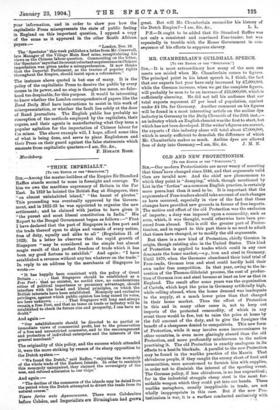SIR, — Among the master-builders of the Empire Sir Stamford Raffles stands
second to none in foresight and courage. To him we owe the maritime supremacy of Britain in the Far East. In 1819 he hoisted the British flag at Singapore, then "an almost uninhabited island," "the haunt of pirates." This proceeding was eventually approved by the Govern- ment, and in 1822-23 he was appointed to organise the new
settlement ; and he claimed with justice to have given it "the purest and most liberal constitution in India." His Report to the Bengal Government began as follows :—" First I have declared that the port of Singapore is a free port and the trade thereof open to ships and vessels of every nation, free of duty, equally and alike to all" (Regulation II. of 1823). In a letter he observes that the rapid growth of Singapore "may be considered as the simple but almost magic result of that perfect freedom of trade which it has been my good fortune to establish." And again: "I have established a revenue without any tax whatever on the trade." In reply to an address by the merchants of Singapore he wrote :—
"It has happily been consistent with the policy of Great
Britain that Singapore should be established as a Free Port : that no sinister, no sordid view, no considerations either of political importance or pecuniary advantage, should interfere with the broad and liberal principles, on which the British interests have been established. Monopoly and exclusive privileges, against which public opinion has long raised its voice, are here unknown That Singapore will long and always remain a free Port, and that no taxes on trade or industry will be established to check its future rise and prosperity, I can have no doubt."
And again :—
"Our establishments should be directed to no partial or immediate views of commercial profit, but to the preservation of a free and unrestricted commerce, and to the encouragement and protection of individual enterprise and the interests of the general merchant."
The originality of this policy, and the success which attended it, were the more striking by reason of its sharp opposition to the Dutch system :-
•
"We found the Dutch," said Raffles, "enjoying the monopoly of the whole trade of the Eastern Islands. In order to maintain this monopoly unimpaired, they claimed the sovereignty of the seas, and refused admission to our ships."
And again :—
"The decline of the commerce of the islands may be dated from the period when the Dutch attempted to divert the trade from its natural course."
Vizere fortes ante Agantemnona. There were Cobdenites before Cobden, and Imperialists ere Birmingham had grown
the Dutch Empire ?—I am, Sir, &c., L. L.
P.S.—It ought to be added that Sir Stamford Raffles was not only a consistent and convinced Free-trader, but was repeatedly in trouble with the Home Government in con- sequence of his efforts to suppress slavery.










































 Previous page
Previous page